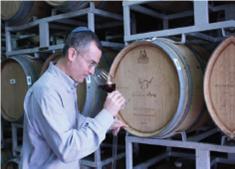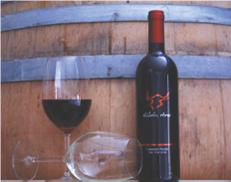Amichai Luria was only four years old when his family made aliyah from America and moved to Jerusalem. When he married Yael eighteen years ago, they decided to move to Maaleh Levonah, just a few short kilometers from Shiloh. They felt it was important to help settle this isolated community located on a lone hilltop. Maaleh Levona’s situation was difficult then and driving through the Arab villages was hazardous. For fifteen years Amichai and his wife were involved in the satisfying job of construction and renovations, knowing they were helping build communities in Biblical Samaria and they prided themselves on almost exclusively employing Jewish laborers.
 One year, the Lurias learned wine making as a hobby and went so far as to dig a cave in their backyard and build themselves a small winery. In the year 2005, an American Zionist investor offered Amichai to turn the winery into a business and since then his life has changed.
One year, the Lurias learned wine making as a hobby and went so far as to dig a cave in their backyard and build themselves a small winery. In the year 2005, an American Zionist investor offered Amichai to turn the winery into a business and since then his life has changed.
Being a vintner, Amichai says, is a responsibility and a privilege. “You have to be especially careful when dealing with wine and appreciate that everything dealt with in moderation, with the right dosages, can be right and good and even holy. Wine was used for the rites and rituals in the services of the Tabernacle and the Holy Temple. Every Jewish holiday gets inducted by a blessing over a cup of wine. Passover has its Four Cups of Wine symbolizing the four terms of Redemption mentioned in the Bible, and Purim has the commandment to drink wine to celebrate the Jews’ victory over the evil Haman. The Jewish marriage ceremony has seven blessings said over a cup of wine to sanctify the union, and even a Jewish baby’s circumcision service includes a blessing over a cup of wine, the baby’s lips dabbed by a dot of wine.
Amichai chose Shiloh, a wonderfully appropriate location for a winery. The Bible records Shiloh as the earliest place in the world where grapes were grown and wine produced. The ancient text of the Book of Judges tells of the daughters of Shilo coming out of the vineyards to dance. (21:21)
Amichai admits that his business suffers a bit because of being located in Samaria. Europe even taxes his wine for export simply because of where his wine is made. It makes competition difficult. But the winery still manages to produce 50,000 bottles a year. “And I’d rather sell to people who love us, who feel that they want to buy from us because of where we are.”
Amichai loves meeting Christian groups through CFOIC Heartland. He practices gracious hospitality, a quality he attributes to the patriarch Abraham, who welcomed people into his tent. Though his business has grown, he still likes showing groups his small boutique winery in Maaleh Levona, inviting them into his home, and on a clear day, proudly sharing his incredible view of the Mediterranean and even Mount Hermon capped with snow!
 Amichai believes in personal service. No effort is too great to please his customers. Even if you buy one bottle of his wine, he’ll give you his cell phone number. If you order a case of wine from a small town in the U.S., e-mail Amichai your questions and he’ll respond. If you’re visiting Israel, he’ll give you a private tour at your convenience.
Amichai believes in personal service. No effort is too great to please his customers. Even if you buy one bottle of his wine, he’ll give you his cell phone number. If you order a case of wine from a small town in the U.S., e-mail Amichai your questions and he’ll respond. If you’re visiting Israel, he’ll give you a private tour at your convenience.
During the Exile, Jewish professions did not connect them to their land. And the first thing the Jewish people did, when they returned after 2,000 years, was to work the land. Amichai feels blessed to love what he does. It says in Jeremiah, “Thou shalt yet plant vines upon the mountains of Samaria.” (31:4) “I am growing grapes in these mountains. Not in the Golan Heights, not in Tel-Aviv. But here. When I grow grapes here, I am bringing the Redemption through the land. I am fulfilling prophecy. It’s the most natural thing in the world.”
If you are interested in visiting Amichai at his winery, contact CFOIC Heartland.
